
Hollywood Cemetery is a large, sprawling cemetery located next to Richmond, Virginia's, Oregon Hill neighborhood at 412 South Cherry Street. Characterized by rolling hills and winding paths overlooking the James River, it is the resting place of two United States Presidents, James Monroe and John Tyler, as well as the only Confederate States President, Jefferson Davis. It is also the resting place of 28 Confederate generals, more than any other cemetery in the country; these include George Pickett and J.E.B. Stuart.
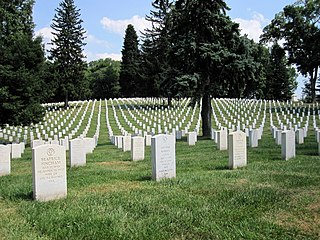
Culpeper National Cemetery is a United States National Cemetery located in the town of Culpeper, in Culpeper County, Virginia. Administered by the United States Department of Veterans Affairs, it encompasses 29.6 acres (120,000 m2) of land, and as 2021, had over 14,000 interments.

Winchester National Cemetery is a United States National Cemetery located in the city of Winchester in Frederick County, Virginia. Administered by the United States Department of Veterans Affairs, it encompasses 4.9 acres (2.0 ha), and as of the end of 2005, it had 5,561 interments. It is closed to new interments.

The Hebrew Cemetery in Richmond, Virginia, also known as Hebrew Burying Ground, dates from 1816. This Jewish cemetery, one of the oldest in the United States, was founded in 1816 as successor to the Franklin Street Burial Grounds of 1789. Among those interred here is Josephine Cohen Joel, who was well known in the early 20th century as the founder of Richmond Art Co. Within Hebrew Cemetery is a plot known as the Soldier's Section. It contains the graves of 30 Jewish Confederate soldiers who died in or near Richmond. It is one of only two Jewish military cemeteries outside of the State of Israel.

Cedar Hill Cemetery in Hartford, Connecticut is located at 453 Fairfield Avenue. It was designed by landscape architect Jacob Weidenmann (1829–1893) who also designed Hartford's Bushnell Park. Its first sections were completed in 1866 and the first burial took place on July 17, 1866. Cedar Hill was designed as an American rural cemetery in the tradition of Mount Auburn Cemetery in Cambridge, Massachusetts.

Farmville Historic District is a national historic district located at Farmville, Prince Edward County, Virginia. It encompasses 246 contributing buildings and 1 contributing object in the central business district and surrounding residential areas of Farmville. It includes a variety of commercial, residential, institutional, and industrial buildings dating from the mid-19th to early-20th centuries. Notable buildings include the Paulett-Gill house, Farmville Presbyterian Church, Johns Memorial Episcopal Church (1881), Farmville Methodist Church (1907), Hotel Weyanoke (1925), the warehouses of the Dunnington Tobacco Company and Central Virginia Processing, Inc., the former Craddock-Terry Shoe Company, the former Cunningham and Company tobacco prizery, Norfolk and Western Railroad passenger station, Doyne Building, the Watkins M. Abbitt Federal Building (1917), Prince Edward County Courthouse, and the former Farmville High School (1913). Located in the district is the separately listed First Baptist Church.
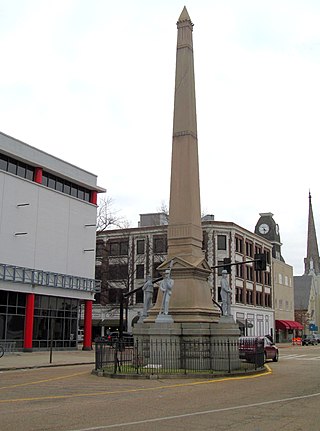
The Confederate Monument in Portsmouth, Virginia, was built between 1876 and 1881. It was listed on the National Register of Historic Places (NRHP) in 1997.

East Hill Cemetery, also known as Maryland Hill, Round Hill, Rooster Hill, and City Cemetery, is a historic cemetery located at Bristol, Virginia. It is an American Civil War-era cemetery established in 1857, with sections for Confederate soldiers and veterans as well as a small section for African American burials. In 1995, the United Daughters of the Confederacy put up a small commemorative monument to the Civil War dead. Among its graves are the founders of the city, representatives of enslaved African-Americans, Civil War soldiers including those who died as a result of the war as well as those who survived the war, a Revolutionary War General of Militia Evan Shelby, and many who have made contributions to Bristol and the nation. It straddles the Tennessee-Virginia border.

Fairview Cemetery, also known as Citizens' Cemetery and Antioch Cemetery, is a historic cemetery located at Culpeper, Culpeper County, Virginia, United States.

Ivy Hill Cemetery is a historic rural cemetery and national historic district located at Smithfield, Isle of Wight County, Virginia. It was established in 1886, and is a privately owned cemetery. Grave markers within the cemetery date from the mid-19th century to the present day. It includes a number of notable funerary monuments.

King and Queen Courthouse Green Historic District is a national historic district located at King and Queen Court House, near Shacklefords, King and Queen County, Virginia. It encompasses eight contributing buildings, seven contributing structures, and two contributing objects in the county seat of King and Queen County. The district includes a small courthouse compound with a courthouse, clerk's office, and county jail, a granite monument and brick wall, a hotel / tavern building, a school, a specialty store building, and a residence on the site of another hotel and tavern.

Mathews County Courthouse Square is a national historic district located at Mathews, Mathews County, Virginia. It encompasses seven contributing buildings, one contributing site, two contributing structures, and 2 contributing objects on Courthouse Square. The courthouse is a T-shaped, Federal style brick building constructed in 1792–1795. Associated with the courthouse are the clerks office (1859), the former jail and later sheriffs office, "Old Jail," and Mathews County Library (1930). Several monuments occupy the square, notably the Confederate monument, the 1928 Fort Cricket Hill monument, and a World War I cannon.
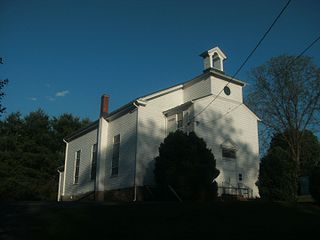
Flint Hill Baptist Church is a historic Southern Baptist church in Flint Hill, Rappahannock County, Virginia. The original section was built in 1854 and expanded and remodeled in the 1890s in the Late Victorian style. The original section is a one-story, gable-roofed, frame-and-weatherboard rectangular structure. Later additions are the front entrance tower topped with a belfry and Sunday school rooms to the rear. It features six stained-glass windows. Also on the property is the contributing church cemetery. Among those buried in the churchyard is Confederate Private Albert Gallatin Willis, one of Mosby's Rangers and a seminarian who offered himself for execution in the place of a married comrade-in-arms; the grave is noted with a marker in the Civil War Trails series.

Mount Jackson Historic District is a national historic district located at Mount Jackson, Shenandoah County, Virginia.

Maiden Spring is a historic home and farm complex and national historic district located at Pounding Mill, Tazewell County, Virginia. The district encompasses eight contributing buildings, two contributing sites, and one contributing structure. The main house consists of a large two-story, five-bay, frame, central-passage-plan dwelling with an earlier frame dwelling, incorporated as an ell. Also on the property are the contributing meat house, slave house, summer kitchen, horse barn, the stock barn, the hen house, the granary / corn crib, the source of Maiden Spring, the cemetery, and the schoolhouse. It was the home of 19th-century congressman, magistrate and judge Rees Bowen (1809–1879) and his son, Henry (1841-1915), also a congressman. During the American Civil War, Confederate Army troops camped on the Maiden Spring Farm.

Kimberling Lutheran Cemetery is a historic Lutheran cemetery and national historic district located near Rural Retreat, Wythe County, Virginia. The cemetery includes approximately about 50 early Germanic sandstone monuments dating from 1800 to 1850. The associated Kimberlin Lutheran Church was built in 1913, and is a large frame structure with two unequal-sized towers.

West Point Cemetery, also known as Potter's Field and Calvary Cemetery, is a historic cemetery and national historic district located at Norfolk, Virginia. It encompasses three contributing sites, one contributing structure, and one contributing object in an African American graveyard in downtown Norfolk. The cemetery was established in 1873, and includes a grouping of headstones marking the remains of 58 black soldiers and sailors who served in the American Civil War, and a monument honoring these veterans stands over their graves. Other notable elements include the Potter's Field, O’Rourke Mausoleum, and the West Point Cemetery entry sign.
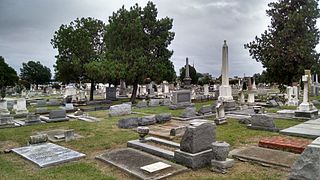
Cedar Grove Cemetery is a historic public cemetery located at Portsmouth, Virginia. It was established by an act of the Virginia General Assembly in 1832. The cemetery contains more than 400 graves with monuments dating from the late 1700s to the present. Its memorial markers include small tablets, ledger stones, obelisks, columnar monuments and mausoleums. They include notable examples of Greek Revival, Late Victorian, and Exotic Revival funerary art.
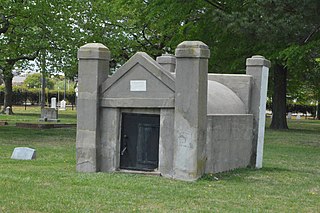
Elmwood Cemetery is a historic municipal cemetery located at Norfolk, Virginia. It was established in 1853, and is filled with monuments and mausoleums that embody the pathos and symbolism of the Christian view of death as a temporary sleep. A notable monument is the Recording Angel by William Couper (1853–1942) at the Couper Family plot. The Core Mausoleum (1910–1915) designed by Harold Van Buren Magonigle (1867–1935), with sculptures by Edward Field Sanford, Jr. (1886–1951), is another notable resource.

Oak Hill Cemetery is a rural cemetery located in Cedar Rapids, Iowa, United States. It was listed as a historic district on the National Register of Historic Places in 2013. At the time of its nomination it consisted of 17 resources, which included 13 contributing buildings, one contributing site, two contributing structures, and one contributing object.

























